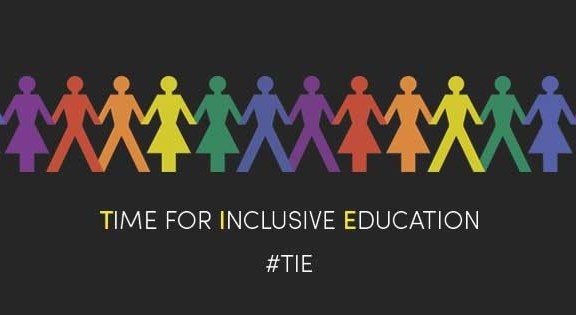
Cat Boyd (The National, Scotland)
NOVEMBER 17TH, 2015
JORDAN Daly is 20 years old, strikingly handsome and instantly likeable, a student who’s unquestionably bright but not remotely staid or posh. He’s also gay. In many Scottish schools, that’s a problem: so much so that Jordan, aged 12, planned to save up his pocket money to buy rope to hang himself. “I planned to kill myself because I hated myself so much”, he now admits matter-of-factly. Telling that story might seem like shock tactics, but Jordan offers it to stress how typical his experience is: 26 per cent of LGBTI school students actually attempt suicide, and many more contemplate it.
Today, Jordan runs Time for Inclusive Education (TIE), a campaign that seeking to bring these shocking facts to light across schools in Scotland. He co-founded TIE with Liam Stevenson, 37, a hunky father to a four-year-old girl. Liam may look like a gay pin-up, but he talks and acts like a stereotypical heterosexual tanker driver, because, well, he’s a heterosexual tanker driver: he even offers me DIY advice.
The two are best friends, but they’ve only known each other for a year. TIE is the latest innovative campaign to grow out of the hothouse atmosphere of the 2014 independence referendum. Liam, a seemingly macho working-class guy, provided an unlikely outlet for Jordan’s stories about his traumatic experience with sexuality. “It wasn’t until I met Liam that I was able to properly talk about what I went through when I was 12,” he told me. “I don’t want to be defined by what happened to me, but if it helps one kid in the school, then I’m happy to talk about it. This happened to me eight years ago, and today I’m receiving emails from kids who are going through the exact same thing. Nearly a decade has gone by and nothings really changed.” Liam interrupts for emphasis: “Yep, no progress at all”.
Of course, officially, there’s been lots of progress. In 1980, sex between two men of any age was still illegal in Scotland. By comparison, it was decriminalised in Italy in 1890, Denmark in 1933, Iceland in 1940, Sweden in 1944, England and Wales in 1967, West Germany in 1969, and Norway in 1972. Even in 2000, when I was in S4 at Holy Cross High School in Hamilton, a significant portion of Scotland was backing Margaret Thatcher’s homophobic Section 28 law against “teaching homosexuality” in schools. Now I’m 30, and Scotland has just been voted “the best country in Europe for LGBTI equality”. On the surface, there’s progress.
Sadly, though, LGBTI in schools is still something of a taboo subject. The campaign to repeal Section 28 was ultimately victorious, but it also revealed a very ugly side of Scottish politics. Some of the worst bigotry came from Scotland’s centre-left institutions. Michael Connarty, until recently a Falkirk Labour MP, warned of “active militant gays” among the teaching profession, who, in his experience, “groomed young boys who seemed to be leaning in a particular direction”.
And of course, there’s Brian Souter. Souter, who bankrolled the SNP until recently and was described as “one of the outstanding entrepreneurs of his generation” by Alex Salmond, shelled out £1 million for a campaign to keep Section 28. Although the SNP didn’t take Souter’s side on that issue, his financing of the party and his Keep the Clause campaign are still embarrassing for many Scottish progressives.
HARDLY anyone defends homophobic bullying anymore. But the issue is suppressed for a few reasons. First, we blame the bullies themselves, not the institutions and the people in power. Second, a repressive attitude prevails which says that homosexuality is fine for other people in private, but intolerable in public, and certainly not in front of “my children”. Third, issues like gay marriage are still seen as private moral matters rather than ideological left-right issues. Labour politicians such as Michael McCann and SNP figures like John Mason still trample around “voting with their conscience” against gay rights; and too often party leaders overlook prejudice in the name of principle.
I find Liam and Jordan likeable because they confront all the stereotypes about the issue. There’s nothing “politically correct” about them: they don’t sound like an Oxbridge-educated Radio 4 panel, or a mealy-mouthed quango. Their graphic design is hip and approachable, unlike the standard leftist models. Liam challenges the idea that only LGBTI people need to care about “gay issues”, showing it’s a campaign everyone should support. A year ago, before he discovered the facts, he was, by his own admission, a typical “bloke”; in many ways, he still is. Meet him yourself if you don’t believe me.
There’s a danger that Scotland, having made some legal reforms, falls into a self-congratulatory myth that there’s “no problem here”, or that our institutions are inherently progressive. There’s also the danger that LGBTI politics goes establishment. From the corporate takeover of Pride to the installation of standard government “equality initiatives”, this danger is everywhere. We risk forgetting where rights come from: having won them from below, we assume they’ll get handed down from the top in future. TIE offers a different model. Referencing everyone from Harvey Milk to James Connolly, the three of us talk about direct action, struggles, gay rights history.
I ask Liam and Jordan for a final message. Jordan’s is cautiously optimistic: “things will get better,” he says. “But really, saying that isn’t good enough. I want young people to know that there are a squad of people out there who are fighting to make it better right now, not just in the future.” Liam simply tells me: “Homophobia kills”.
They’re both right. Homophobia is killing kids; it’s also damaging their lives and their education. Much of that homophobia is silently handed down by parents and institutions. But Jordan is also right: history is on our side, if we’re conscious of it. TIE represents precisely the principles that will ensure a victory for justice: challenging injustice without hectoring the unconvinced, appealing to ordinary people without selling out. Scottish politics can learn a lot from their example.







